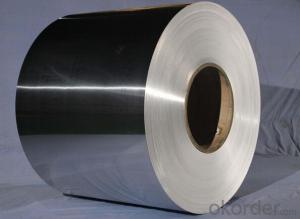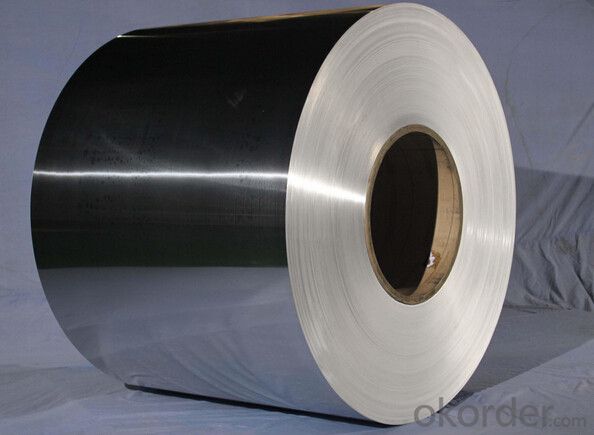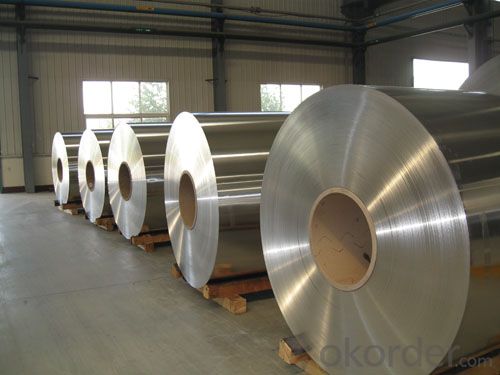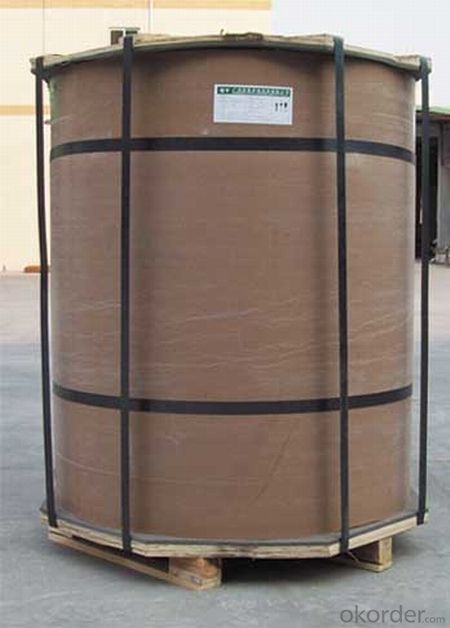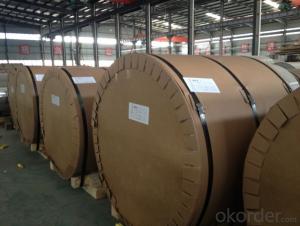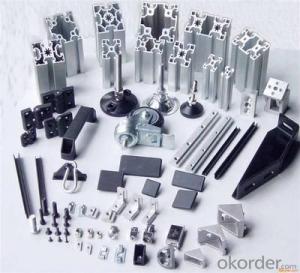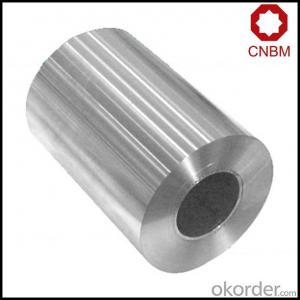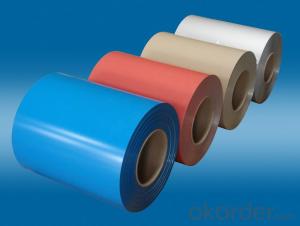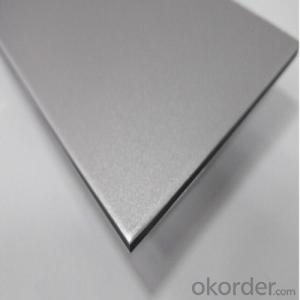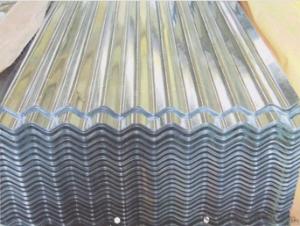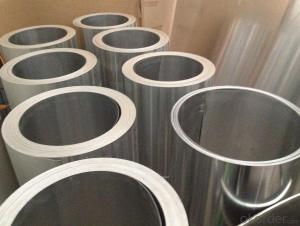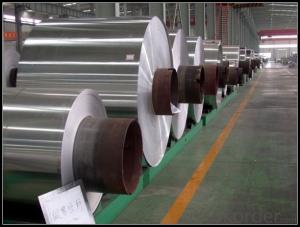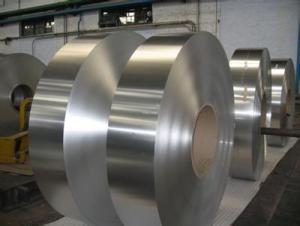High Quality Aluminum Coil Wholesale for Roofing and Boats - Coated Aluminum Sheet from China
- Loading Port:
- Tianjin
- Payment Terms:
- TT OR LC
- Min Order Qty:
- 5 m.t.
- Supply Capability:
- 3000 m.t./month
OKorder Service Pledge
OKorder Financial Service
You Might Also Like
Specification
1. Specification of coated aluminum sheet
Thickness | 0.1mm-10mm |
Popular Thickness | 0.1mm/0.2mm/0.25mm/0.3mm/0.6mm/0.8mm/1.0mm/1.2mm/1.5mm/2.0mm/3.0mm... |
Width | 20mm-2500mm |
inner diameter | 505mm 508mm 605mm |
Material | 1050,1060,1070,1100,1200,3003,3004,3005,5052,5005,5754,5083 |
Temper | O,H12,H14,H16,H18,H22,H24,H26,H32,H34,H36,H38,H111,H112 |
Surface | mill finish |
Packing | Export standard wooden pallets |
Payment Terms | 100% irrevocable L/C at sight or 30% T/T in advance as deposit,70% balance against the B/L copy |
Minimum Order Quantity | 5000kg |
Delivery time | 15-25 days after receiving L/C or deposit |
2. Application of coated aluminum sheet
(1).Interior: wall cladding, ceilings, bathrooms, kitchens and balconies, shutters, doors...
(2).Exterior: wall cladding, facades, roofing, canopies, tunnels,column covers , renovations...
(3).Advertisement: display platforms, signboards, fascia, shop fronts...
3. Feature of coated aluminum sheet
*Such coil is specially designed to replace aluminum ingot, due to the high export tax of aluminum ingot, the coil has better price than ingot.
*This type of coil can fit customer's remelting furnace just like ingot, no need to make any change to the production line that was previously used for ingot. The standard coil size and weight is very suitable for the feed gate of furnace.
*This type of coil causes less material wastage than ingot when remelted.
*Our coil is made directly from ore, no need to go though the ingot making process, quality is much better than other suppliers who use ingot scrap to make coil.
Be free from Oil Stain, Dent, Inclusion, Scratches, Stain, Oxide Dicoloration, Breaks, Corrosion, Roll Marks, Dirt Streaks and other defect which will interfere with use
4. Certificate:
SGS and ROHS(if client request, paid by client), MTC(plant provided), Certificate of Origin(FORM A, FORM E, CO), Bureau Veritas and SGS (if client request, paid by client), CIQS certificate
5. Image of coated aluminum sheet
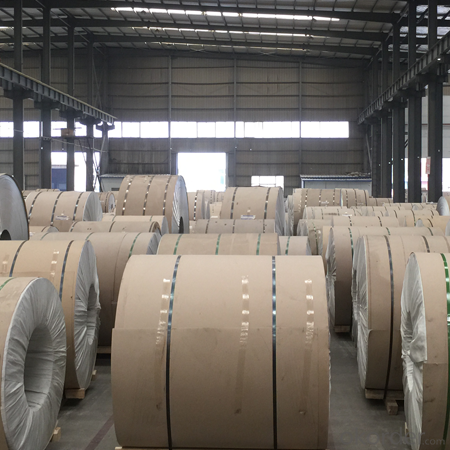
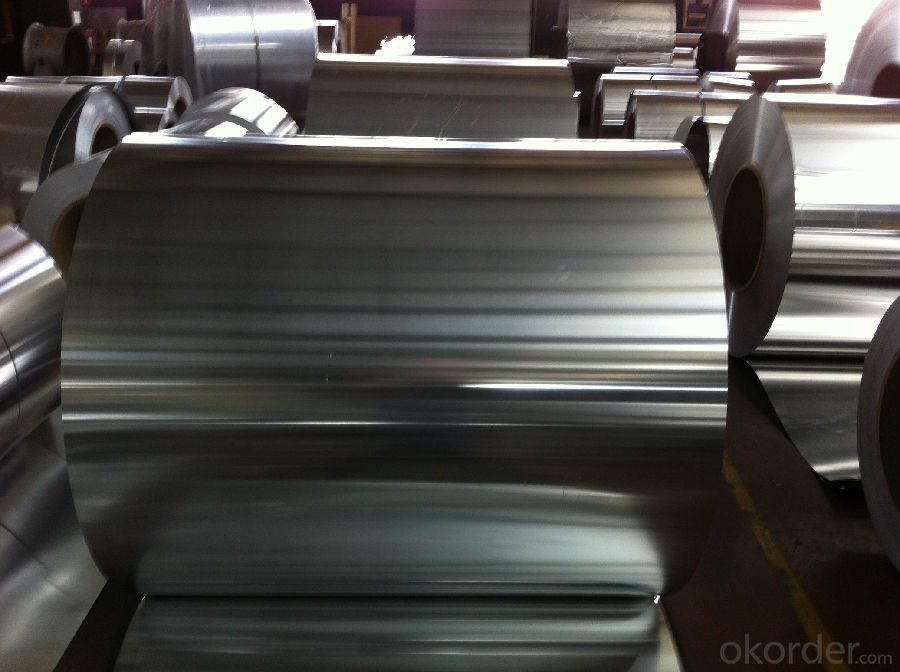
6. Package and shipping of coated aluminum sheet
eye to wall
eye to the wall
with wood pallet
7. FAQ
1) What is the delivery time?
Dpends on actual order, around 20 to 35 days
2)What is the QC system:
We have QC staff of 20 persons and advanced equipment, each production is with MTC traced from Aluminum ingot lot.
3) What market do you mainly sell to?
Australia, America, Asia, Middle East, Western Europe, Africa etc
- Q: What are the common surface cleaning methods for aluminum coils?
- There exist various effective surface cleaning techniques for aluminum coils, which can eradicate dirt, debris, and other impurities. Among the most frequently employed methods is pressure washing. This involves utilizing a high-pressure water spray to dislodge and eliminate any dirt or grime from the coil's surface. Pressure washing can be conducted using specialized equipment or simply a regular garden hose with a spray nozzle attachment. Chemical cleaning serves as another popular approach for cleansing aluminum coils. This method entails utilizing specific cleaning agents or solvents, specially formulated to break down and eradicate dirt and impurities from the coils' surface. These chemicals are typically applied using a spray bottle or a pump sprayer and then rinsed off with water after a designated period. Steam cleaning represents another effective technique for cleaning aluminum coils. This involves employing high-temperature steam to loosen and eliminate dirt and grime from the coil's surface. Steam cleaning is often used in conjunction with a cleaning agent or solvent to enhance its efficacy. In addition to these methods, there are specialized tools available, such as coil cleaning brushes or fin combs, which can be utilized to physically remove any debris or build-up from the coil surfaces. These tools prove particularly useful for eliminating smaller particles or debris that may be trapped in between the fins of the coils. It is essential to note that when cleaning aluminum coils, it is crucial to adhere to the manufacturer's recommendations and guidelines to ensure the cleaning process is conducted safely and effectively. Additionally, regular cleaning and maintenance of aluminum coils can promote their longevity and preserve their efficiency.
- Q: Are there any limitations to the maximum coil diameter of aluminum coils?
- Yes, there are limitations to the maximum coil diameter of aluminum coils. The maximum coil diameter is determined by several factors including the type and thickness of the aluminum, the equipment used for coiling, and the intended application of the coil. Generally, larger coil diameters can be achieved with thinner and more ductile aluminum alloys. However, as the coil diameter increases, it becomes more challenging to maintain the structural integrity of the coil and prevent deformation, wrinkling, or damage during handling and transportation. Additionally, the equipment used for coiling may have limitations in terms of the maximum diameter it can handle. Therefore, it is important to consider these factors when determining the maximum coil diameter for aluminum coils.
- Q: Well, we've got the existing old school 7 layers of peeling yucky painted siding and we're trying to weigh our options. So here's my questions:1) Is it cost effective to replace Aluminum with Vinyl?2) Is Vinyl truly as costly as we keep hearing? **Home is small 1,100 sq.ft with a 2.5 car Garage**3) Is painting this existing siding a wise choice since the current paint job on it looks terrible? We just need to make it more a home, right now it's gorgeously all new and redone inside and on the outside it still resembles the day we bought it in forclosure. Aside from my green grass I busted my butt on last summer.Please advise.
- get the siding. its not that expensive and you will never have to paint again!
- Q: Are there any specific regulations for the transportation of aluminum coils?
- Yes, there are specific regulations for the transportation of aluminum coils. These regulations aim to ensure the safe handling and transport of aluminum coils to prevent any accidents or damage. Some of the key regulations include: 1. Packaging requirements: Aluminum coils should be properly secured and packaged in suitable containers to prevent shifting, damage, or falling during transportation. This may include the use of strapping, banding, or shrink-wrapping. 2. Weight restrictions: There are weight restrictions on the transport of aluminum coils, which vary depending on the type of transportation mode being used. These restrictions are in place to ensure the stability and safety of the vehicle during transit. 3. Loading and unloading procedures: Proper loading and unloading procedures should be followed to minimize the risk of damage to the coils and to ensure the safety of workers. This may involve the use of specialized equipment such as cranes or forklifts. 4. Hazardous materials regulations: In some cases, aluminum coils may be considered hazardous materials due to their flammability or other characteristics. If this is the case, additional regulations and requirements may apply, such as proper labeling, documentation, and handling procedures. 5. Transportation permits: Depending on the size, weight, and destination of the aluminum coils, specific permits or licenses may be required for their transportation. These permits ensure compliance with local, state, and federal regulations. It is important for companies involved in the transportation of aluminum coils to be aware of and comply with these regulations to ensure the safe and efficient transport of the coils. Failure to adhere to these regulations can result in fines, penalties, or even legal consequences.
- Q: What are the different yield strengths of aluminum coils?
- The yield strengths of aluminum coils can vary depending on the specific grade and temper of the aluminum. Generally, the range of yield strengths for aluminum coils can be anywhere from 15,000 to 75,000 pounds per square inch (psi).
- Q: Can aluminum coils be used in the production of electronic components?
- Yes, aluminum coils can be used in the production of electronic components. Aluminum is a versatile and widely used metal in various industries, including electronics. It offers several advantages such as lightweight, high thermal conductivity, corrosion resistance, and excellent electrical conductivity. These properties make aluminum coils suitable for applications in electronic components like capacitors, transformers, inductors, and heat sinks. The use of aluminum coils in electronic components enables efficient heat dissipation, improved performance, and reduced overall weight of the electronic devices.
- Q: How are aluminum coils tested for strength and durability?
- Strength and durability of aluminum coils are tested thoroughly using multiple methods. One of these methods is tensile testing, which determines the maximum stress a coil can endure before breaking or deforming. This test assesses the overall strength and elasticity of the aluminum. Another crucial test is the hardness test, which measures the aluminum coil's resistance to indentation or scratching. It helps determine the material's durability and ability to resist wear. Moreover, fatigue testing is commonly performed on aluminum coils by repeatedly subjecting them to cyclic loading and unloading. This test simulates real-life conditions and evaluates the coil's ability to withstand repeated stress without failing. Additionally, corrosion resistance plays a vital role in determining the durability of aluminum coils. Therefore, various corrosion tests, including salt spray testing, are conducted to evaluate the coil's resistance to environmental factors that could cause corrosion or degradation over time. In certain cases, non-destructive testing methods like ultrasonic testing or eddy current testing are utilized to detect any internal defects or inconsistencies within the coil that may impact its strength and durability. Overall, a combination of mechanical, physical, and chemical tests are carried out on aluminum coils to ensure they meet the required standards for strength and durability. These tests instill confidence in manufacturers and consumers regarding the quality and reliability of aluminum coils for various applications.
- Q: What are the pros and cons of utilizing aluminum coils in storage applications?
- <p>Aluminum coils offer several advantages for storage, including high durability, corrosion resistance, and lightweight properties which make them easy to handle. They are also recyclable and have good thermal conductivity, which can be beneficial in temperature-controlled environments. However, there are downsides such as higher initial costs compared to some other materials and potential for denting or damage if not properly handled. Additionally, while aluminum is generally non-magnetic, it can be attracted to strong magnets, which might be a consideration in certain storage scenarios.</p>
- Q: What is the coefficient of thermal expansion of aluminum coils?
- The coefficient of thermal expansion of aluminum coils is typically around 23 x 10^-6 per degree Celsius.
- Q: How do aluminum coils compare to copper coils?
- Aluminum coils are generally lighter and less expensive than copper coils, but they have lower thermal conductivity and may require larger coil sizes. Copper coils, on the other hand, have superior heat transfer properties, making them more efficient for cooling or heating applications.
Send your message to us
High Quality Aluminum Coil Wholesale for Roofing and Boats - Coated Aluminum Sheet from China
- Loading Port:
- Tianjin
- Payment Terms:
- TT OR LC
- Min Order Qty:
- 5 m.t.
- Supply Capability:
- 3000 m.t./month
OKorder Service Pledge
OKorder Financial Service
Similar products
Hot products
Hot Searches
Related keywords
